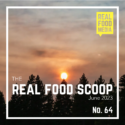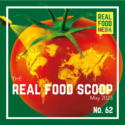Voices of an Organic Planet from Real Food Media on Vimeo.
Can organic farming feed the world?
Ask that question to a chemical industry executive and you’ll hear a resounding, “No!” Ask farmers around the world, who’ve got a grounds eye view of food production, and you’re likely to get a very different answer. That’s just what we did when we traveled to Istanbul, Turkey, for the International Federation of Organic Agricultural Movements (IFOAM) World Organic Congress. Voices of an Organic Planet captures just some of the voices of the more than 1,000 delegates that gather every two years for the IFOAM international convening.
So why don’t more farmers transition to organic? And why isn’t the market for organic food growing even faster? Many farmers are benefitting from organic farming, and consumers are clamoring for organic food, but farmers around the world are finding it difficult to meet the demand for a number of reasons, including: shortages of organic seeds and breeds required for organic production; laws that privatize seeds as intellectual property and criminalize seed saving and sharing; and a lack of funding for research on open-pollinated seeds, varietal development, and traditionally-bred livestock.
Globally less than 1 percent of research dollars for agriculture, public or private, goes into developing and improving organic methods.
Through our conversations with farmers, researchers, and scientists, we heard loud and clear that together we can feed the world—and that supporting inputs, subsidies, and research for organic and agroecological farming is the only path to sustainably feed ourselves in the future.
Read our report from the Congress in Al Jazeera.
After filming Voices of an Organic Planet, we turned to the situation in the country where we live, partnering with the Organic Farming Research Foundation to launch a petition calling on the United States Department of Agriculture (USDA) to help farmers meet this growing demand. Though support for organic farmers grows every year, the USDA still directs only a fraction of its research budget toward open-source seeds and livestock breeds suitable for organic production. We applauded the USDA’s introduction of programs to support organic farmers and urged them to continue to help farmers meet this consumer demand by at least doubling its annual investments toward the development of open-source, publicly-available seeds and breeds suitable for organic production systems. Our petition stressed that organic and conventional farmers need access to the most up-to-date non-patented genetics and breeds capable of thriving in a range of farming regions and called on the USDA to help support this vital research.



